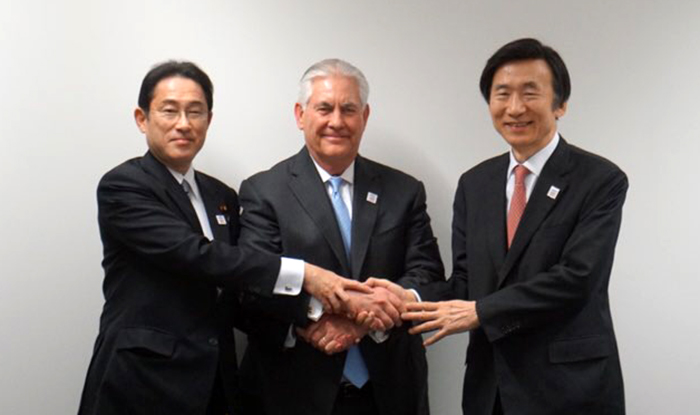-
 Korea.net's 24-hour YouTube channel
Korea.net's 24-hour YouTube channel- NEWS FOCUS
- ABOUT KOREA
- EVENTS
- RESOURCES
- GOVERNMENT
- ABOUT US

Korea, the U.S. and Japan release a joint statement condemning North Korea's Feb. 12 ballistic missile test during a meeting held on the sidelines of the G20 Foreign Ministers Meeting in Bonn, Germany, on Feb. 16. Pictured are Japanese Minister for Foreign Affairs Kishida Fumio (left), U.S. Secretary of State Rex Tillerson (center) and Minister of Foreign Affairs Yun Byung-se.
Korea, the U.S. and Japan have underscored the gravity and urgency of North Korea's nuclear and missile threats, and have strongly condemned Pyongyang's provocations, including the latest ballistic missile launch on Feb. 12.
On the sidelines of the G20 Foreign Ministers Meeting held in Bonn, Germany, Minister of Foreign Affairs Yun Byung-se, U.S. Secretary of State Rex Tillerson and Japanese Minister for Foreign Affairs Kishida Fumio released a joint statement condemning North Korea's nuclear and missile programs.
In the statement, the ministers condemned in the strongest terms North Korea's Feb. 12 ballistic missile test, noting that, "North Korea's has shown flagrant disregard for multiple U.N. Security Council (UNSC) resolutions that expressly prohibit its ballistic missile and nuclear programs."
The three top diplomats affirmed that they "will collaborate to ensure that all countries fully and effectively implement all their obligations and commitments under UNSC Resolutions 2270 and 2321, and that violations of UNSC sanctions by North Korea will be met with an even stronger international response."
The ministers emphasized that, "North Korea must abandon its proscribed nuclear and ballistic missile programs in a complete, verifiable and irreversible manner, and comply with all provisions of the relevant UNSC resolutions. Only this way can North Korea be accepted as a responsible member of the international community."
Secretary Tillerson reiterated that, "The U.S. remains steadfast in its defense commitments to its allies, the Republic of Korea and Japan, including the commitment to provide extended deterrence backed by the full range of its nuclear and conventional defense capabilities."
"There isn't much time left to prevent North Korea's nuclear armament. It's important now more than ever for the international community to unite with a sense of urgency, to put measures in place that will halt the development of Pyongyang's nuclear weapons," said Minister Yun.
Minister Kishida said, "North Korea's latest ballistic missile launch was on another level compared to previous nuclear weapon and missile provocations. It's imperative that we enforce stronger sanctions on North Korea."
Finally, the ministers directed their representatives on North Korean policy to hold consultations in the coming days regarding nuclear and ballistic missile challenges posed by North Korea. They agreed to continue their efforts to enhance trilateral security cooperation in response to North Korean nuclear and missile threats, to fully implement the UNSC resolutions, to uphold the global nuclear nonproliferation regime, and to lead a firm international response to any further violations by North Korea.
By Lee Hana
Korea.net Staff Writer
Photo: Ministry of Foreign Affairs
hlee10@korea.kr
Most popular
- First hearing-impaired K-pop act hopes for 'barrier-free world'
- Expats could account for 7% of population in 20 years: report
- 'Mad Max' director impressed by 'cinema-literate' Korean viewers
- Show in Italy to present 'thought-filled' Korean craftworks
- Romanian presidential couple visits national cemetery













